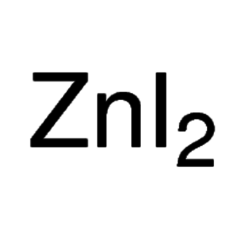You have no items in your shopping cart
Zinc iodide
Zinc iodide is a chemical compound of zinc and iodine, ZnI2. The anhydrous form is white and readily absorbs water from the atmosphere. It can be prepared by the direct reaction of zinc and iodine in refluxing ether. or by reacting zinc with iodine in aqueous solution:
- Zn + I2→ ZnI2
At 1150 °C, zinc iodide vapour dissociates into zinc and iodine.
In aqueous solution the following have been detected, octahedral Zn(H2O)62+, [ZnI(H2O)5]+ and tetrahedral ZnI2(H2O)2, ZnI3(H2O)− and ZnI42−.
The structure of crystalline ZnI2 is unusual, and while zinc atoms are tetrahedrally coordinated, as in ZnCl2, groups of four of these tetrahedra share three vertices to form “super-tetrahedra” of composition {Zn4I10}, which are linked by their vertices to form a three-dimensional structure. These "super-tetrahedra" are similar to the P4O10 structure. Molecular ZnI2 is linear as predicted by VSEPR theory with a Zn-I bond length of 238 pm.

